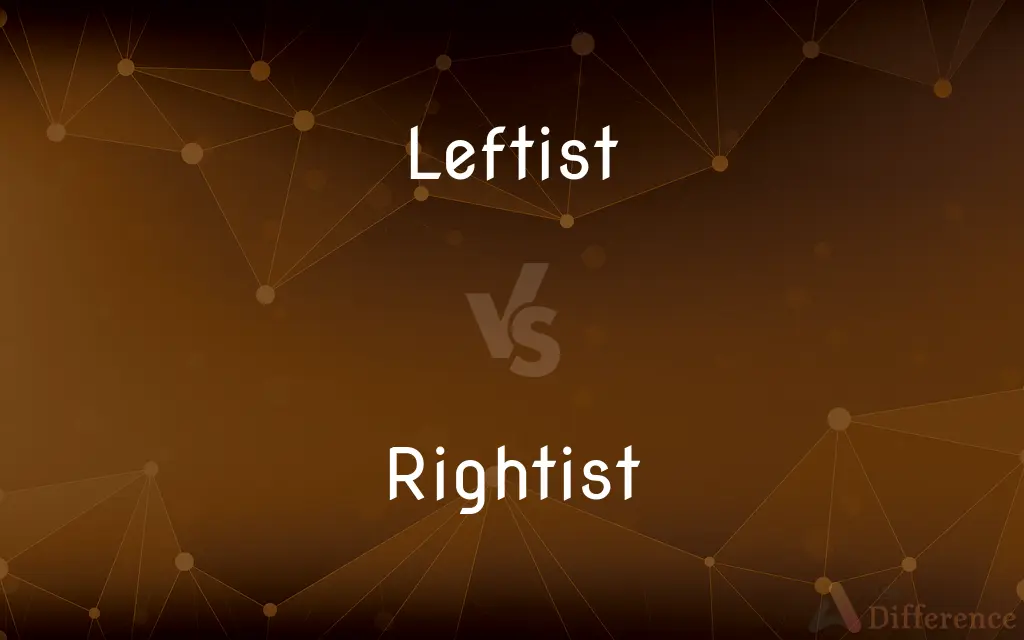Leftist vs. Rightist — What's the Difference?
By Maham Liaqat & Urooj Arif — Updated on March 1, 2024
Leftists advocate for social equality, government intervention in the economy, and progressive policies, while rightists prioritize individual freedom, limited government, and traditional values.

Difference Between Leftist and Rightist
Table of Contents
ADVERTISEMENT
Key Differences
Leftist ideologies typically emphasize social equality, advocating for the government's role in redistributing wealth and regulating the economy to reduce social disparities. Rightist ideologies, on the other hand, prioritize individual freedom, economic liberalism, and the preservation of traditional values. Rightists argue for minimal government intervention in the economy, believing that a free market promotes efficiency and innovation.
Leftist support progressive policies that aim to address social injustices and promote inclusivity. For instance, leftists often champion universal healthcare, public education, and social welfare programs as means to achieve a more equitable society. Rightist often emphasize the importance of personal responsibility, national security, and traditional social structures, advocating policies that support business growth, lower taxes, and conservative social norms.
The fundamental difference between leftists and rightists lies in their views on the role of government, social equality, and economic freedom. While leftists seek to use government policies to reduce inequality and promote social welfare, rightists believe in the power of free markets and individual liberties to drive societal progress.
Leftist and rightist ideologies also differ in their approach to social issues. Leftists generally support progressive changes such as LGBTQ+ rights, abortion rights, and policies aimed at combating climate change. Rightists, conversely, often defend traditional social norms and may be more skeptical of rapid social changes or extensive environmental regulations.
Both leftist and rightist perspectives are essential to democratic societies, offering different solutions to social, economic, and political challenges. The debate between these ideologies shapes the political landscape, influencing policy-making and the direction of national and international politics.
ADVERTISEMENT
Comparison Chart
Economic Policy
Advocates for government intervention
Prefers minimal government intervention
Social Policy
Emphasizes social equality and inclusivity
Prioritizes traditional values and norms
Government Role
Larger role in economy and social welfare
Limited role, focusing on security and freedom
Key Issues
Social welfare, environmental protection
Economic freedom, national security
Philosophical Roots
Equality, social justice
Individual liberty, traditionalism
Compare with Definitions
Leftist
Supports strong environmental regulations.
Leftists push for policies like the Green New Deal to combat climate change.
Rightist
Prioritizes national security and defense spending.
Rightists often advocate for increased military budgets.
Leftist
Advocates for redistributing wealth to reduce inequality.
Leftists support higher taxes on the wealthy to fund social programs.
Rightist
Upholds traditional family and social values.
Rightists may oppose same marriage based on traditional beliefs.
Leftist
Favors public education and services.
Leftists advocate for free college tuition and expanded public education funding.
Rightist
Believes in a free market economy with little regulation.
Rightists argue that deregulation leads to economic growth.
Leftist
Champions progressive social policies.
Leftists support legal protections and rights for LGBTQ+ communities.
Rightist
Advocates for lower taxes to stimulate investment.
Rightists support tax cuts as a means to boost business and job creation.
Leftist
Promotes universal healthcare as a right.
Leftists argue for government-funded healthcare to ensure access for all.
Rightist
Skeptical of government-funded social programs.
Rightists argue that welfare programs discourage self-reliance and work ethic.
Leftist
The ideology of the political left.
Rightist
The ideology of the political right.
Leftist
Belief in or support of the tenets of the political left.
Rightist
Belief in or support of the tenets of the political right.
Leftist
A person who holds views associated with the political left.
Rightist
One who believes in the politics or policies of the political right.
Leftist
Someone who holds socialist or communist-leaning economic views, usually alongside progressive social views; an anticapitalist.
Rightist
(in combination) One who supports the rights of a specified group.
An animal rightist
Leftist
Of or pertaining to the political left.
Rightist
Of or pertaining to the political right.
Leftist
A person who belongs to the political left.
Leftist
A person who belongs to the political left
Common Curiosities
How do leftists and rightists differ in economic policy?
Leftists advocate for government intervention to redistribute wealth, while rightists prefer a free market with minimal government involvement.
What are the core beliefs of rightists?
Rightists prioritize individual freedom, economic liberalism, limited government intervention, and the preservation of traditional values.
How do leftists and rightists approach environmental policy?
Leftists typically support strong environmental regulations, while rightists may prioritize economic considerations and question extensive regulatory approaches.
What defines a leftist ideology?
Leftist ideology is defined by its emphasis on social equality, government intervention in the economy, and progressive social policies.
What role do leftists believe the government should play in healthcare?
Leftists generally believe the government should ensure universal healthcare access, viewing it as a fundamental right.
Are leftist policies the same worldwide?
While leftist policies share common themes, their specific implementation can vary significantly across different countries and political contexts.
Can someone be both leftist and rightist?
While individuals may hold mixed views, the core principles of leftism and rightism are generally seen as opposing ideologies.
How do leftists view social welfare programs?
Leftists view social welfare programs as essential tools for reducing inequality and ensuring a basic standard of living for all.
Why do rightists advocate for lower taxes?
Rightists argue that lower taxes stimulate economic growth by allowing individuals and businesses to invest and spend more freely.
What is the rightist stance on social issues?
Rightists often defend traditional social norms and may be more cautious about progressive changes to society and culture.
Can the terms "leftist" and "rightist" apply to social movements?
Yes, these terms can also describe the ideological leanings of social movements, reflecting their core values and objectives.
Why is the debate between leftists and rightists important?
The debate shapes political discourse, influencing policy decisions and the direction of societies based on differing views on government's role and societal values.
Do rightists oppose all government intervention?
Not necessarily; rightists support government intervention in areas like national defense and law enforcement but seek limited involvement in the economy and social welfare.
How do leftists and rightists view education policy?
Leftists typically support public education and government-funded programs, while rightists may advocate for school choice and privatization.
What impact do leftist and rightist ideologies have on elections?
These ideologies form the basis of political party platforms, significantly influencing voter preferences and election outcomes.
Share Your Discovery

Previous Comparison
Destiny vs. Lot
Next Comparison
Tuna vs. TunnyAuthor Spotlight
Written by
Maham LiaqatCo-written by
Urooj ArifUrooj is a skilled content writer at Ask Difference, known for her exceptional ability to simplify complex topics into engaging and informative content. With a passion for research and a flair for clear, concise writing, she consistently delivers articles that resonate with our diverse audience.















































